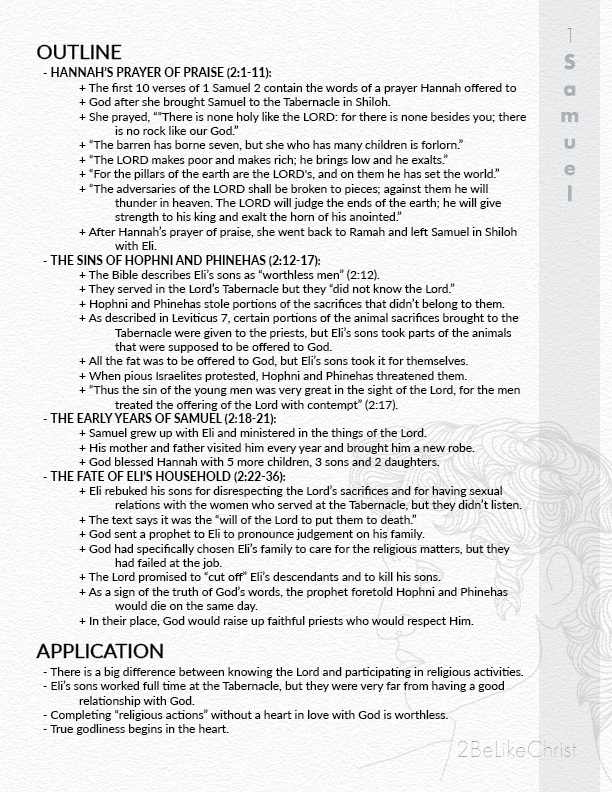1 Samuel 2 Summary - 5 Minute Bible Study
1 Samuel 2 Summary - A Quick Overview
WHEN:
The birth of Samuel is usually dated between 1100 B.C. and 1070 B.C.
Samuel was born in chapter 1, and he is described as a “boy” in chapter 2.
CHARACTERS:
Hannah – Samuel’s mother. She had previously been barren, but God answered her prayer (1 Samuel 1) and gave her a son.
Samuel – The firstborn son of Hannah. He grew up in Shiloh serving the Lord at the Tabernacle.
Eli – The 14th judge of Israel. He was a priest who served God at the Tabernacle.
Hophni and Phinehas – Eli’s sons who served at the Tabernacle with him. They were wicked men who continually disrespected God.
WHERE:
Elkanah, Hannah, and Peninnah lived in Ramah, between Gibeah and Mizpah.
The Tabernacle of God was in Shiloh.
OUTLINE:
HANNAH’S PRAYER OF PRAISE (2:1-11):
The first 10 verses of 1 Samuel 2 contain the words of a prayer Hannah offered to God after she brought Samuel to the Tabernacle in Shiloh.
She prayed, ““There is none holy like the LORD: for there is none besides you; there is no rock like our God.”
“The barren has borne seven, but she who has many children is forlorn.”
“The LORD makes poor and makes rich; he brings low and he exalts.”
“For the pillars of the earth are the LORD's, and on them he has set the world.”
“The adversaries of the LORD shall be broken to pieces; against them he will thunder in heaven. The LORD will judge the ends of the earth; he will give strength to his king and exalt the horn of his anointed.”
After Hannah’s prayer of praise, she went back to Ramah and left Samuel in Shiloh with Eli.
THE SINS OF HOPHNI AND PHINEHAS (2:12-17):
The Bible describes Eli’s sons as “worthless men” (2:12).
They served in the Lord’s Tabernacle but they “did not know the Lord.”
Hophni and Phinehas stole portions of the sacrifices that didn’t belong to them.
As described in Leviticus 7, certain portions of the animal sacrifices brought to the Tabernacle were given to the priests, but Eli’s sons took parts of the animals that were supposed to be offered to God.
All the fat was to be offered to God, but Eli’s sons took it for themselves.
When pious Israelites protested, Hophni and Phinehas threatened them.
“Thus the sin of the young men was very great in the sight of the Lord, for the men treated the offering of the Lord with contempt” (2:17).
THE EARLY YEARS OF SAMUEL (2:18-21):
Samuel grew up with Eli and ministered in the things of the Lord.
His mother and father visited him every year and brought him a new robe.
God blessed Hannah with 5 more children, 3 sons and 2 daughters.
THE FATE OF ELI’S HOUSEHOLD (2:22-36):
Eli rebuked his sons for disrespecting the Lord’s sacrifices and for having sexual relations with the women who served at the Tabernacle, but they didn’t listen.
The text says it was the “will of the Lord to put them to death.”
God sent a prophet to Eli to pronounce judgement on his family.
God had specifically chosen Eli’s family to care for the religious matters, but they had failed at the job.
The Lord promised to “cut off” Eli’s descendants and to kill his sons.
As a sign of the truth of God’s words, the prophet foretold Hophni and Phinehas would die on the same day.
In their place, God would raise up faithful priests who would respect Him.
APPLICATION:
There is a big difference between knowing the Lord and participating in religious activities.
Eli’s sons worked full time at the Tabernacle, but they were very far from having a good relationship with God.
Completing “religious actions” without a heart in love with God is worthless.
True godliness begins in the heart.


